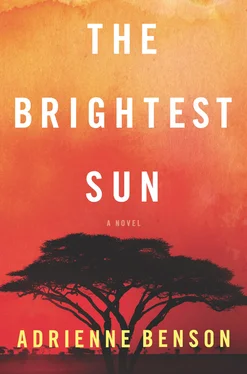She hated herself a little more each day when it grew dark without him coming. And she hated him for causing her to hope that he’d ignore the way she’d brushed him off in Narok and come find her, anyway. The multiplying cells inside of her—his baby—had nothing to do with her confusing feelings about the man himself. This was her usual pain: wanting to be seen and loved but being utterly unable to let herself allow it. She accepted being alone, she liked it, but there was the occasional wondering. How would it be to share a life with a man? Maybe with this man? How would it feel to see him and to allow herself to be seen? Each evening when he didn’t appear, she nursed her disappointment by listing the reasons it was better to be alone. She knew them by heart—and she knew that however many items she listed, there was really only one reason: her own fear. This made her hate herself, too.
The dust gathered in her hair and made her itch, but she didn’t go back to Narok to shower. She lived with it, like the Maasai did. She was adjusting, she convinced herself, to the life of an embedded anthropologist. When she really understood she was pregnant, and it was long after she could do anything about it, she felt too paralyzed to make the effort to find out who the man was, exactly, and to let him know. She couldn’t imagine the conversation they’d have to have, or the decisions they’d have to make. It was too much. She told herself over and over again that she didn’t want a relationship, she preferred being in a place where everyone was different from her, where she could restrict her interactions and be just an observer. The man—the baby’s father—wouldn’t allow her to limit herself. He would require more than she felt she knew how to give. More than she wanted to give. Intimacy was a risky thing.
Now, here he was.
A Maasai woman, squatting in the shadows by the low embers of the fire pit, reached out and handed him a chipped enamel cup of chai. He took it and thanked her in Maa. He looked perfectly relaxed, happy even, to be there. Leona was grateful Simi had gone to the river; surely she would have noticed Leona’s discomfort. Surely she would have fit the pieces of the puzzle together. And what then? Leona felt a sudden anger burn in her chest—here was another man who walked in without permission, who settled in her space with no regard to whether she wanted him there or not.
“Were you going to tell me?” the baby’s father asked now.
Leona shut her eyes tightly. She answered in Maa.
“Go away. It’s not your child.”
“That’s bullshit, and we both know it.” He paused, then spoke so quietly Leona could barely hear him. “I didn’t have a good father myself, but I think I’d like to try to be one.” His voice cracked slightly. “Whether or not you want me in your life, the girl deserves a father in hers.”
“You had a shitty father? Well, so did I,” she said. “What makes you think you’d do a better job?”
She saw the man wince. His expression hardened. She knew she’d hit a nerve—she’d hurt him. She wasn’t happy about that, but she sensed a shift in his attitude and felt relief. If she had to hurt him in order to get him to leave her alone, so be it.
To her surprise, he spoke again. “Give me a chance to be a better father than mine, or yours, apparently.”
She felt hemmed in, strangled. Why wouldn’t he just go? Like a trapped animal, she bit hard. “A father is the last thing this baby needs. I didn’t tell you because I didn’t want you to know, because I don’t want her to suffer through a terrible childhood like I did. You’re not going to change my mind.”
* * *
Leona grew up watching the rain fall on the green, green grass in the yard of her parents’ home in Beaverton, Oregon. Her father was a surgeon—never around during the day—and her mother was only a shadowy presence, less a mother than a waft of perfume in another room, always on the way out, always saying goodbye. Leona was left home with a housekeeper who lazily vacuumed the Persian rugs and huddled on the back deck in her blue uniform smoking secret cigarettes and blowing rings into the wet sky. Leona had no siblings, and was never encouraged to bring friends home or to go to parties, so she was ignored at school. Not bullied, not sought after, but invisible.
If she were ever asked to sum up her childhood in one word, she would have said silent. Silence was forced on her. Her father’s infrequent presence was a dark thing, covered by night and a sleeping house. The crack of her bedroom door opening and the memory of rough skin pressed against Leona’s cheek, the dank smell of his breath and his wet lips hissing in her ear, “Don’t tell your mother. Don’t say anything to anyone. You’ll ruin it...you’ll ruin me.” Those nights Leona bit her soft inner cheeks bloody and raw to keep from making a sound.
Only once did she try to break the silence with her mother. Her father always left the house early, and at breakfast one day Leona unlocked her voice. Her mother smiled at her over her toast, and Leona whispered a phrase she’d chosen carefully, the canary in the mine. “Dad came into my room last night.” The coffee bubbled loudly in the percolator, and Leona found that forever after, the sound made her anxious.
Her mother’s pause lasted a lifetime. Leona dragged her fork through the egg yolks on her plate, afraid to look up.
“Your father is under a lot of pressure at work,” her mother finally answered, and when Leona glanced up to explain what she meant, to spill it all out like a liquid from a broken bottle, she caught her mother’s eye. There was a tiny flicker there, a lit candle, and then the curtain snapped tightly shut over it. A shutter firmly closed against a possible storm.
After that, Leona kept the secret locked away from everything else. In the daytime she sat through classes at school, concentrating hard, always finding the correct answer. In the evenings, she sat at the kitchen table doing homework while the maid ironed. Her mother came and went, came and went, off to Ladies Auxiliary meetings or the Junior League. Leona’s insides turned to stone, but she never wondered if her mother noticed that her father couldn’t look Leona in the eyes.
The invisibility—the pressure not to speak—became a habit. It saw her through high school and college and, later, through her doctoral program in sociocultural anthropology. Leona grew a jagged space—a broken section deep inside. She learned that people, especially the ones closest to her, weren’t to be trusted.
She declared a major in anthropology because she felt she’d never learned to understand humans; her childhood had given her no great notion of how her own species worked. She was desperate to go as far away from her parents as she could. Leona wrote with skill and conviction and her Fulbright application was chosen. Three months later she was ensconced in a bathroom-sized mud-and-cow-dung inkajijik, in a manyatta filled with identical inkajijiks. They all circled the central livestock corral and were protected from lions and elephants by thorny acacia branches piled in a ring around the whole cluster. In the rare letters to her parents, Leona referred to her new home as a “gated community.”
Dusty and crowded, the manyatta was noisy with the grunting of livestock that lived inside the circle of thorny branches, and the sounds of hyenas, wildebeests and the occasional lion from outside. The small door to her hut was open—as they all were—and she loved the voices she could hear almost always, even brighter in the night, from the tiny huts all around her. She loved the constant scent of other humans and the way the livestock made the air smell tangy. It surprised her at first that she even loved the lack of physical space in the Maasai culture and how a child climbed into her lap every time she sat down and how the other women included her without question in their daily lives. For the first time she felt seen. Eventually she realized her comfort came from the fact that she was foreign. The language barrier and the cultural differences gave her the perfect excuse to feign misunderstanding, to keep people at a manageable distance—not physically, perhaps, but emotionally. At home she couldn’t hide this way. Her unwillingness to be vulnerable was an obvious thing, a scarlet letter people read as standoffish, odd. Here, her days were filled with sound and the presence of people, and she felt warm in it, relaxed, fully in charge of the depth and frequency of any emotional exchange.
Читать дальше












